Effects of Insufficient Team Skills in a State Grade Hospital Report
VerifiedAdded on 2022/09/26
|10
|2101
|28
Report
AI Summary
This report examines the effects of insufficient team skills within a state-grade hospital, focusing on how these deficiencies impact organizational performance and the achievement of objectives. The study explores the negative consequences of inadequate team skills, such as poor project outcomes and difficulties in meeting goals. It investigates the frequency of these issues and proposes solutions like team member training and the addition of skilled personnel. The report analyzes the advantages and disadvantages of these solutions, considering implications for cost, time, and resource allocation. Findings highlight the benefits of hiring competent individuals to improve team dynamics. The conclusion emphasizes the need for technological innovations to mitigate the effects of insufficient team skills and enhance overall operational efficiency.

Management 1
Effects of Insufficient Team Skills in a state Grade Hospital
By (Name)
Name of the Class
Name of the professor
Institutional affiliation
City and State
Date
Effects of Insufficient Team Skills in a state Grade Hospital
By (Name)
Name of the Class
Name of the professor
Institutional affiliation
City and State
Date
Paraphrase This Document
Need a fresh take? Get an instant paraphrase of this document with our AI Paraphraser
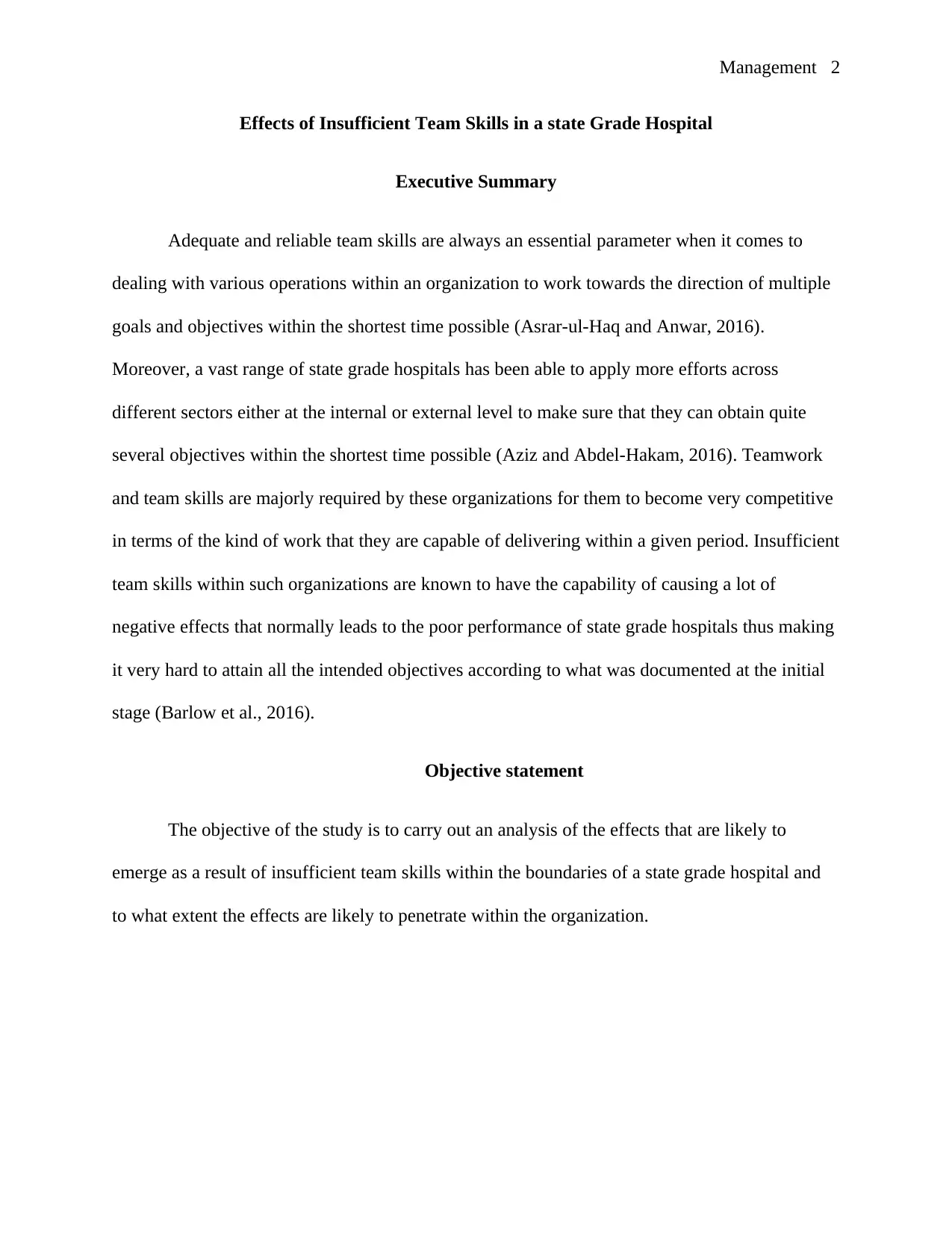
Management 2
Effects of Insufficient Team Skills in a state Grade Hospital
Executive Summary
Adequate and reliable team skills are always an essential parameter when it comes to
dealing with various operations within an organization to work towards the direction of multiple
goals and objectives within the shortest time possible (Asrar-ul-Haq and Anwar, 2016).
Moreover, a vast range of state grade hospitals has been able to apply more efforts across
different sectors either at the internal or external level to make sure that they can obtain quite
several objectives within the shortest time possible (Aziz and Abdel-Hakam, 2016). Teamwork
and team skills are majorly required by these organizations for them to become very competitive
in terms of the kind of work that they are capable of delivering within a given period. Insufficient
team skills within such organizations are known to have the capability of causing a lot of
negative effects that normally leads to the poor performance of state grade hospitals thus making
it very hard to attain all the intended objectives according to what was documented at the initial
stage (Barlow et al., 2016).
Objective statement
The objective of the study is to carry out an analysis of the effects that are likely to
emerge as a result of insufficient team skills within the boundaries of a state grade hospital and
to what extent the effects are likely to penetrate within the organization.
Effects of Insufficient Team Skills in a state Grade Hospital
Executive Summary
Adequate and reliable team skills are always an essential parameter when it comes to
dealing with various operations within an organization to work towards the direction of multiple
goals and objectives within the shortest time possible (Asrar-ul-Haq and Anwar, 2016).
Moreover, a vast range of state grade hospitals has been able to apply more efforts across
different sectors either at the internal or external level to make sure that they can obtain quite
several objectives within the shortest time possible (Aziz and Abdel-Hakam, 2016). Teamwork
and team skills are majorly required by these organizations for them to become very competitive
in terms of the kind of work that they are capable of delivering within a given period. Insufficient
team skills within such organizations are known to have the capability of causing a lot of
negative effects that normally leads to the poor performance of state grade hospitals thus making
it very hard to attain all the intended objectives according to what was documented at the initial
stage (Barlow et al., 2016).
Objective statement
The objective of the study is to carry out an analysis of the effects that are likely to
emerge as a result of insufficient team skills within the boundaries of a state grade hospital and
to what extent the effects are likely to penetrate within the organization.
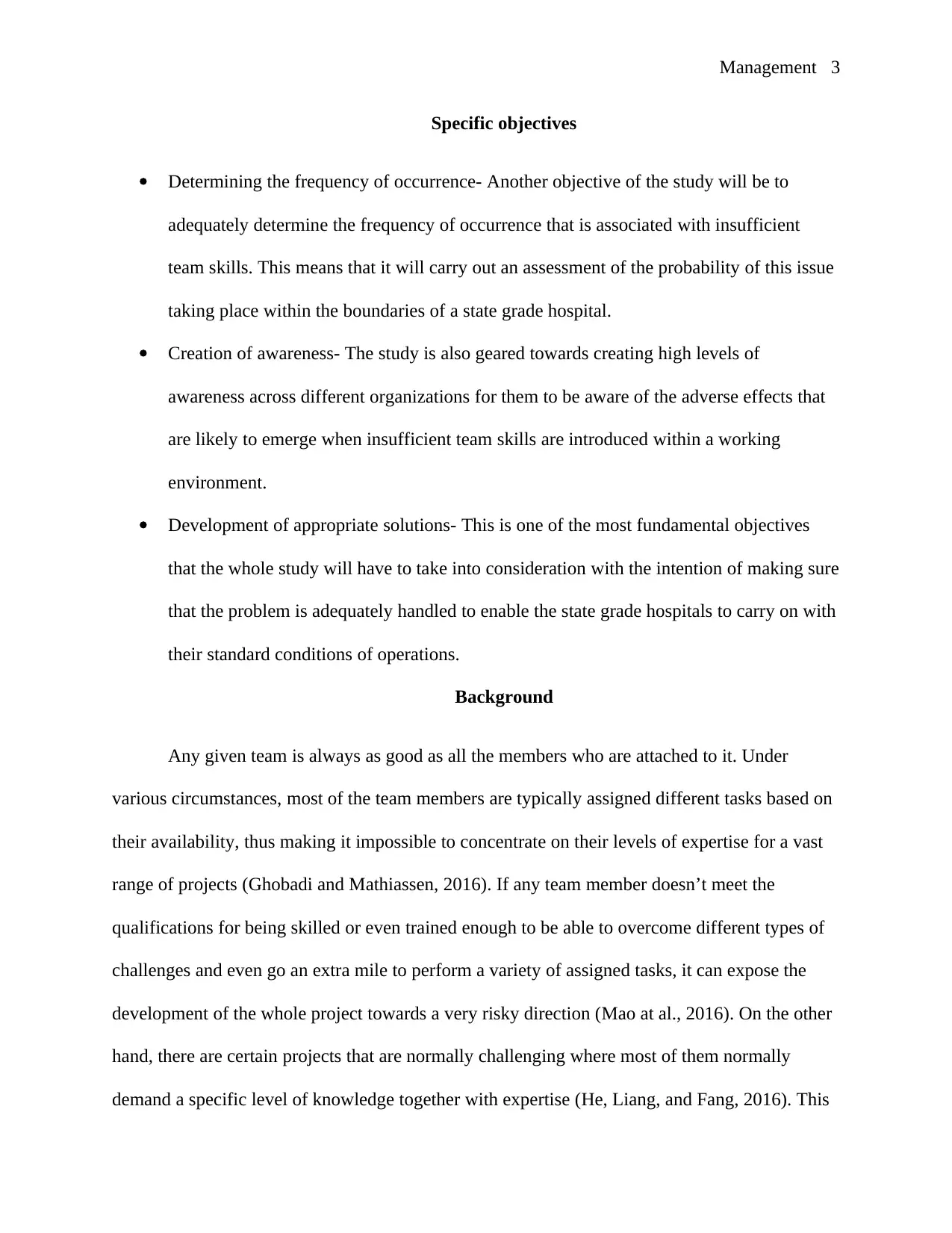
Management 3
Specific objectives
Determining the frequency of occurrence- Another objective of the study will be to
adequately determine the frequency of occurrence that is associated with insufficient
team skills. This means that it will carry out an assessment of the probability of this issue
taking place within the boundaries of a state grade hospital.
Creation of awareness- The study is also geared towards creating high levels of
awareness across different organizations for them to be aware of the adverse effects that
are likely to emerge when insufficient team skills are introduced within a working
environment.
Development of appropriate solutions- This is one of the most fundamental objectives
that the whole study will have to take into consideration with the intention of making sure
that the problem is adequately handled to enable the state grade hospitals to carry on with
their standard conditions of operations.
Background
Any given team is always as good as all the members who are attached to it. Under
various circumstances, most of the team members are typically assigned different tasks based on
their availability, thus making it impossible to concentrate on their levels of expertise for a vast
range of projects (Ghobadi and Mathiassen, 2016). If any team member doesn’t meet the
qualifications for being skilled or even trained enough to be able to overcome different types of
challenges and even go an extra mile to perform a variety of assigned tasks, it can expose the
development of the whole project towards a very risky direction (Mao at al., 2016). On the other
hand, there are certain projects that are normally challenging where most of them normally
demand a specific level of knowledge together with expertise (He, Liang, and Fang, 2016). This
Specific objectives
Determining the frequency of occurrence- Another objective of the study will be to
adequately determine the frequency of occurrence that is associated with insufficient
team skills. This means that it will carry out an assessment of the probability of this issue
taking place within the boundaries of a state grade hospital.
Creation of awareness- The study is also geared towards creating high levels of
awareness across different organizations for them to be aware of the adverse effects that
are likely to emerge when insufficient team skills are introduced within a working
environment.
Development of appropriate solutions- This is one of the most fundamental objectives
that the whole study will have to take into consideration with the intention of making sure
that the problem is adequately handled to enable the state grade hospitals to carry on with
their standard conditions of operations.
Background
Any given team is always as good as all the members who are attached to it. Under
various circumstances, most of the team members are typically assigned different tasks based on
their availability, thus making it impossible to concentrate on their levels of expertise for a vast
range of projects (Ghobadi and Mathiassen, 2016). If any team member doesn’t meet the
qualifications for being skilled or even trained enough to be able to overcome different types of
challenges and even go an extra mile to perform a variety of assigned tasks, it can expose the
development of the whole project towards a very risky direction (Mao at al., 2016). On the other
hand, there are certain projects that are normally challenging where most of them normally
demand a specific level of knowledge together with expertise (He, Liang, and Fang, 2016). This
⊘ This is a preview!⊘
Do you want full access?
Subscribe today to unlock all pages.

Trusted by 1+ million students worldwide
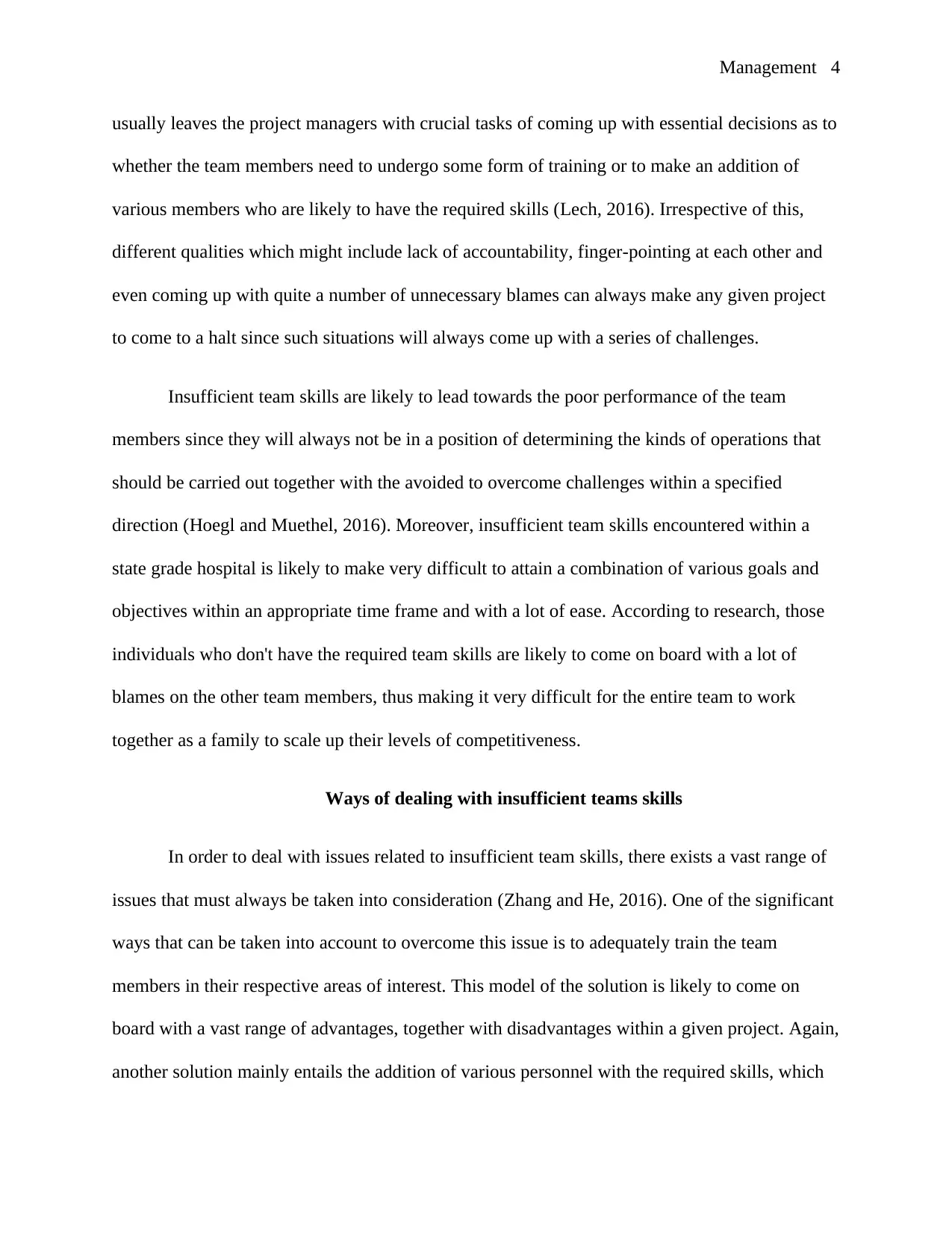
Management 4
usually leaves the project managers with crucial tasks of coming up with essential decisions as to
whether the team members need to undergo some form of training or to make an addition of
various members who are likely to have the required skills (Lech, 2016). Irrespective of this,
different qualities which might include lack of accountability, finger-pointing at each other and
even coming up with quite a number of unnecessary blames can always make any given project
to come to a halt since such situations will always come up with a series of challenges.
Insufficient team skills are likely to lead towards the poor performance of the team
members since they will always not be in a position of determining the kinds of operations that
should be carried out together with the avoided to overcome challenges within a specified
direction (Hoegl and Muethel, 2016). Moreover, insufficient team skills encountered within a
state grade hospital is likely to make very difficult to attain a combination of various goals and
objectives within an appropriate time frame and with a lot of ease. According to research, those
individuals who don't have the required team skills are likely to come on board with a lot of
blames on the other team members, thus making it very difficult for the entire team to work
together as a family to scale up their levels of competitiveness.
Ways of dealing with insufficient teams skills
In order to deal with issues related to insufficient team skills, there exists a vast range of
issues that must always be taken into consideration (Zhang and He, 2016). One of the significant
ways that can be taken into account to overcome this issue is to adequately train the team
members in their respective areas of interest. This model of the solution is likely to come on
board with a vast range of advantages, together with disadvantages within a given project. Again,
another solution mainly entails the addition of various personnel with the required skills, which
usually leaves the project managers with crucial tasks of coming up with essential decisions as to
whether the team members need to undergo some form of training or to make an addition of
various members who are likely to have the required skills (Lech, 2016). Irrespective of this,
different qualities which might include lack of accountability, finger-pointing at each other and
even coming up with quite a number of unnecessary blames can always make any given project
to come to a halt since such situations will always come up with a series of challenges.
Insufficient team skills are likely to lead towards the poor performance of the team
members since they will always not be in a position of determining the kinds of operations that
should be carried out together with the avoided to overcome challenges within a specified
direction (Hoegl and Muethel, 2016). Moreover, insufficient team skills encountered within a
state grade hospital is likely to make very difficult to attain a combination of various goals and
objectives within an appropriate time frame and with a lot of ease. According to research, those
individuals who don't have the required team skills are likely to come on board with a lot of
blames on the other team members, thus making it very difficult for the entire team to work
together as a family to scale up their levels of competitiveness.
Ways of dealing with insufficient teams skills
In order to deal with issues related to insufficient team skills, there exists a vast range of
issues that must always be taken into consideration (Zhang and He, 2016). One of the significant
ways that can be taken into account to overcome this issue is to adequately train the team
members in their respective areas of interest. This model of the solution is likely to come on
board with a vast range of advantages, together with disadvantages within a given project. Again,
another solution mainly entails the addition of various personnel with the required skills, which
Paraphrase This Document
Need a fresh take? Get an instant paraphrase of this document with our AI Paraphraser
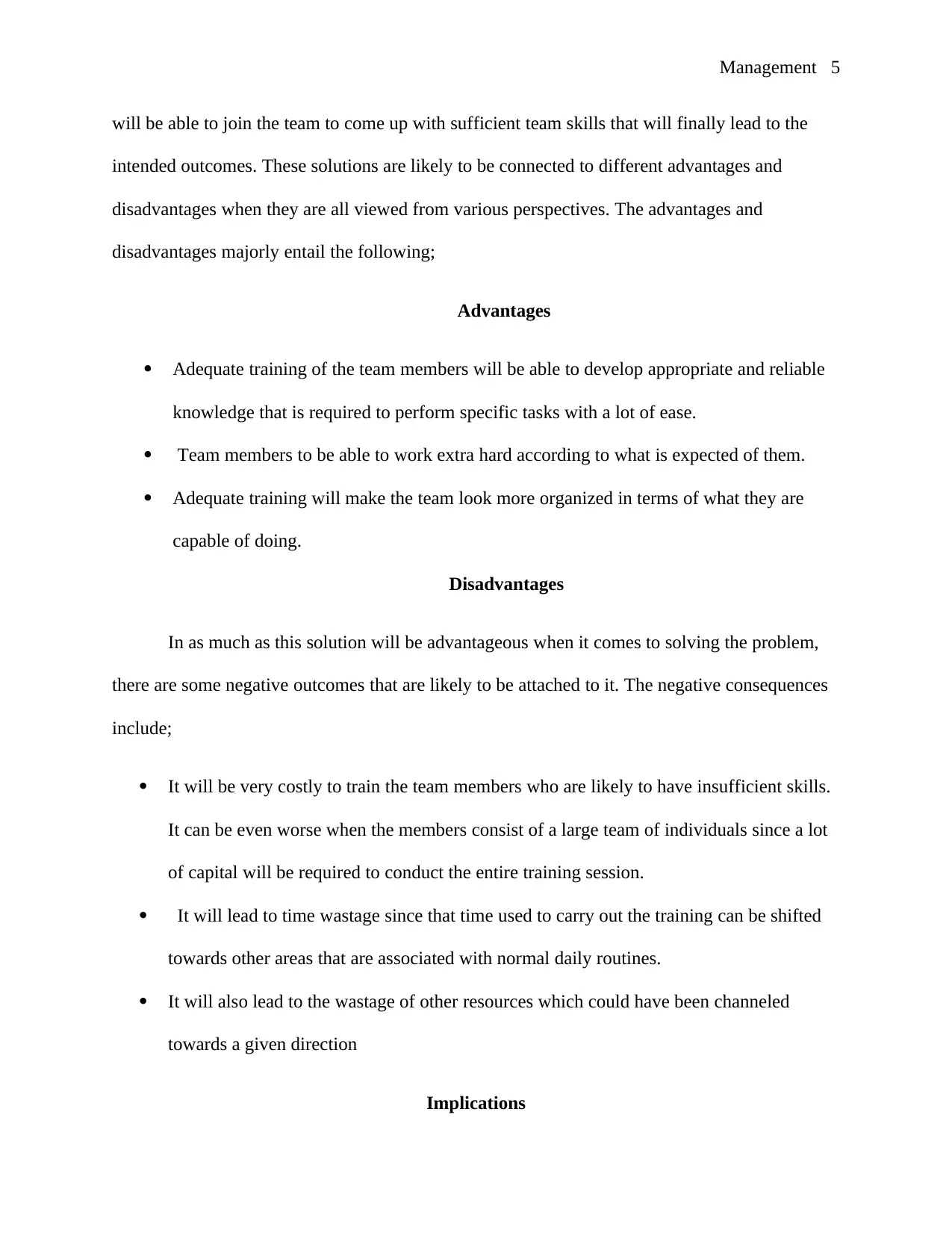
Management 5
will be able to join the team to come up with sufficient team skills that will finally lead to the
intended outcomes. These solutions are likely to be connected to different advantages and
disadvantages when they are all viewed from various perspectives. The advantages and
disadvantages majorly entail the following;
Advantages
Adequate training of the team members will be able to develop appropriate and reliable
knowledge that is required to perform specific tasks with a lot of ease.
Team members to be able to work extra hard according to what is expected of them.
Adequate training will make the team look more organized in terms of what they are
capable of doing.
Disadvantages
In as much as this solution will be advantageous when it comes to solving the problem,
there are some negative outcomes that are likely to be attached to it. The negative consequences
include;
It will be very costly to train the team members who are likely to have insufficient skills.
It can be even worse when the members consist of a large team of individuals since a lot
of capital will be required to conduct the entire training session.
It will lead to time wastage since that time used to carry out the training can be shifted
towards other areas that are associated with normal daily routines.
It will also lead to the wastage of other resources which could have been channeled
towards a given direction
Implications
will be able to join the team to come up with sufficient team skills that will finally lead to the
intended outcomes. These solutions are likely to be connected to different advantages and
disadvantages when they are all viewed from various perspectives. The advantages and
disadvantages majorly entail the following;
Advantages
Adequate training of the team members will be able to develop appropriate and reliable
knowledge that is required to perform specific tasks with a lot of ease.
Team members to be able to work extra hard according to what is expected of them.
Adequate training will make the team look more organized in terms of what they are
capable of doing.
Disadvantages
In as much as this solution will be advantageous when it comes to solving the problem,
there are some negative outcomes that are likely to be attached to it. The negative consequences
include;
It will be very costly to train the team members who are likely to have insufficient skills.
It can be even worse when the members consist of a large team of individuals since a lot
of capital will be required to conduct the entire training session.
It will lead to time wastage since that time used to carry out the training can be shifted
towards other areas that are associated with normal daily routines.
It will also lead to the wastage of other resources which could have been channeled
towards a given direction
Implications
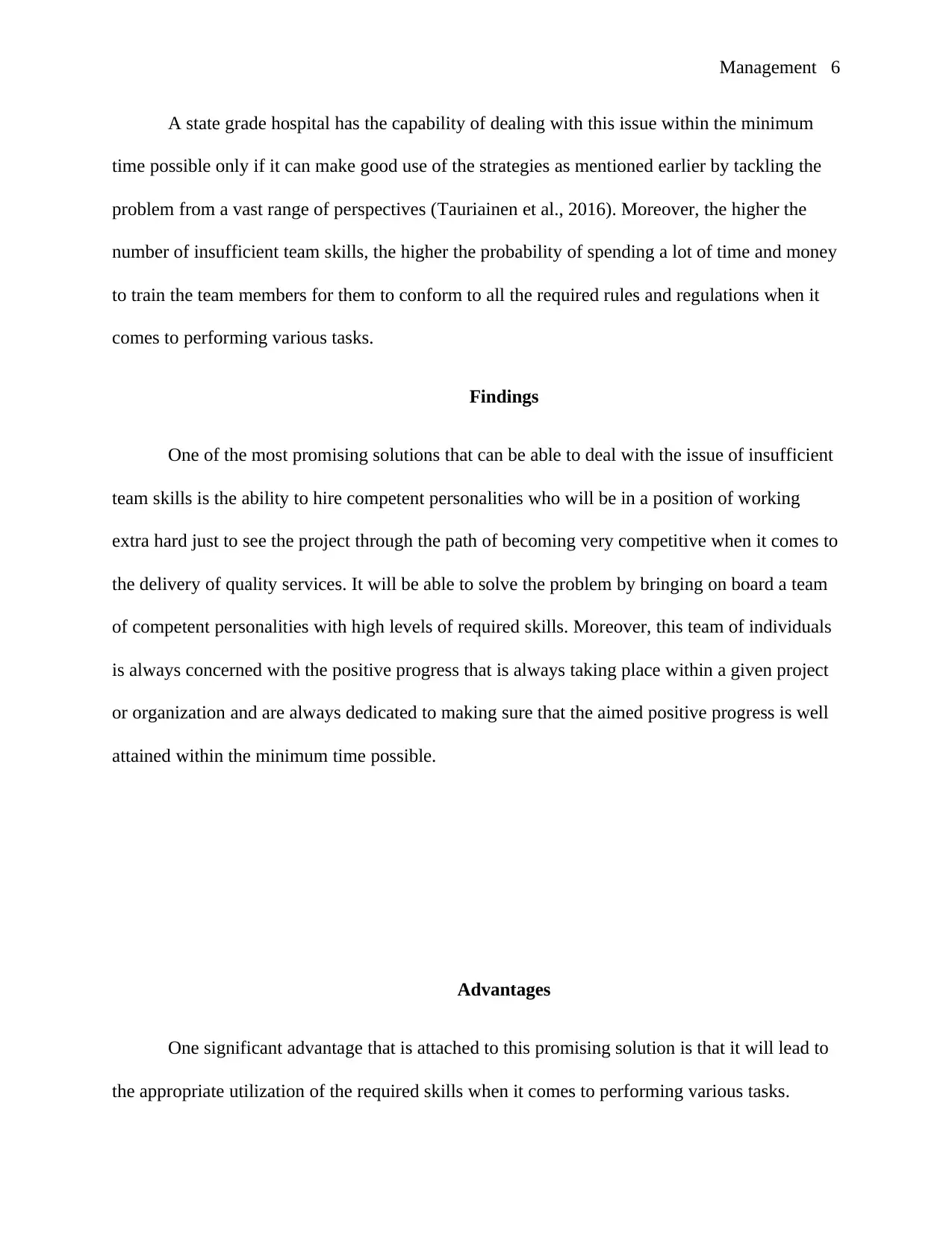
Management 6
A state grade hospital has the capability of dealing with this issue within the minimum
time possible only if it can make good use of the strategies as mentioned earlier by tackling the
problem from a vast range of perspectives (Tauriainen et al., 2016). Moreover, the higher the
number of insufficient team skills, the higher the probability of spending a lot of time and money
to train the team members for them to conform to all the required rules and regulations when it
comes to performing various tasks.
Findings
One of the most promising solutions that can be able to deal with the issue of insufficient
team skills is the ability to hire competent personalities who will be in a position of working
extra hard just to see the project through the path of becoming very competitive when it comes to
the delivery of quality services. It will be able to solve the problem by bringing on board a team
of competent personalities with high levels of required skills. Moreover, this team of individuals
is always concerned with the positive progress that is always taking place within a given project
or organization and are always dedicated to making sure that the aimed positive progress is well
attained within the minimum time possible.
Advantages
One significant advantage that is attached to this promising solution is that it will lead to
the appropriate utilization of the required skills when it comes to performing various tasks.
A state grade hospital has the capability of dealing with this issue within the minimum
time possible only if it can make good use of the strategies as mentioned earlier by tackling the
problem from a vast range of perspectives (Tauriainen et al., 2016). Moreover, the higher the
number of insufficient team skills, the higher the probability of spending a lot of time and money
to train the team members for them to conform to all the required rules and regulations when it
comes to performing various tasks.
Findings
One of the most promising solutions that can be able to deal with the issue of insufficient
team skills is the ability to hire competent personalities who will be in a position of working
extra hard just to see the project through the path of becoming very competitive when it comes to
the delivery of quality services. It will be able to solve the problem by bringing on board a team
of competent personalities with high levels of required skills. Moreover, this team of individuals
is always concerned with the positive progress that is always taking place within a given project
or organization and are always dedicated to making sure that the aimed positive progress is well
attained within the minimum time possible.
Advantages
One significant advantage that is attached to this promising solution is that it will lead to
the appropriate utilization of the required skills when it comes to performing various tasks.
⊘ This is a preview!⊘
Do you want full access?
Subscribe today to unlock all pages.

Trusted by 1+ million students worldwide
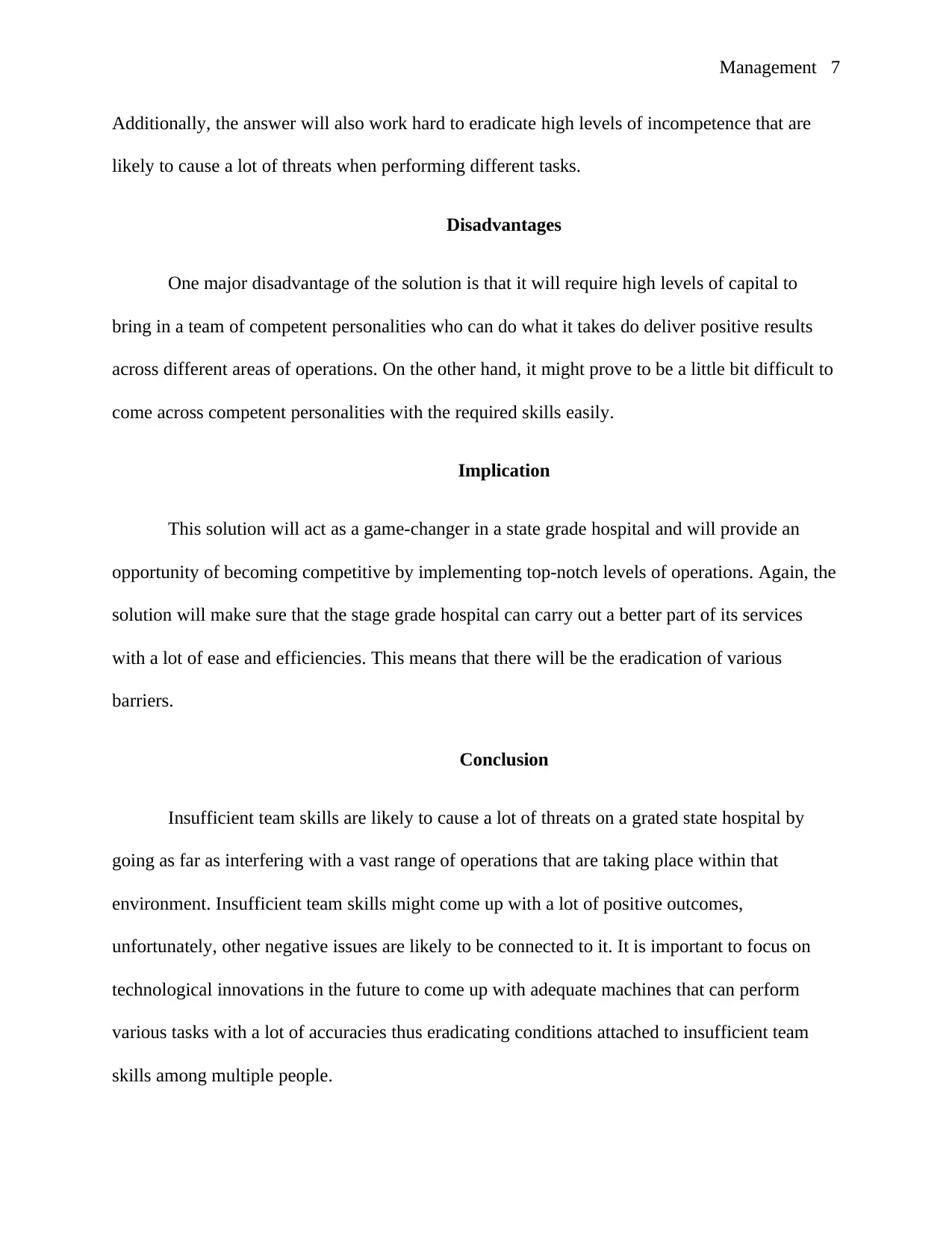
Management 7
Additionally, the answer will also work hard to eradicate high levels of incompetence that are
likely to cause a lot of threats when performing different tasks.
Disadvantages
One major disadvantage of the solution is that it will require high levels of capital to
bring in a team of competent personalities who can do what it takes do deliver positive results
across different areas of operations. On the other hand, it might prove to be a little bit difficult to
come across competent personalities with the required skills easily.
Implication
This solution will act as a game-changer in a state grade hospital and will provide an
opportunity of becoming competitive by implementing top-notch levels of operations. Again, the
solution will make sure that the stage grade hospital can carry out a better part of its services
with a lot of ease and efficiencies. This means that there will be the eradication of various
barriers.
Conclusion
Insufficient team skills are likely to cause a lot of threats on a grated state hospital by
going as far as interfering with a vast range of operations that are taking place within that
environment. Insufficient team skills might come up with a lot of positive outcomes,
unfortunately, other negative issues are likely to be connected to it. It is important to focus on
technological innovations in the future to come up with adequate machines that can perform
various tasks with a lot of accuracies thus eradicating conditions attached to insufficient team
skills among multiple people.
Additionally, the answer will also work hard to eradicate high levels of incompetence that are
likely to cause a lot of threats when performing different tasks.
Disadvantages
One major disadvantage of the solution is that it will require high levels of capital to
bring in a team of competent personalities who can do what it takes do deliver positive results
across different areas of operations. On the other hand, it might prove to be a little bit difficult to
come across competent personalities with the required skills easily.
Implication
This solution will act as a game-changer in a state grade hospital and will provide an
opportunity of becoming competitive by implementing top-notch levels of operations. Again, the
solution will make sure that the stage grade hospital can carry out a better part of its services
with a lot of ease and efficiencies. This means that there will be the eradication of various
barriers.
Conclusion
Insufficient team skills are likely to cause a lot of threats on a grated state hospital by
going as far as interfering with a vast range of operations that are taking place within that
environment. Insufficient team skills might come up with a lot of positive outcomes,
unfortunately, other negative issues are likely to be connected to it. It is important to focus on
technological innovations in the future to come up with adequate machines that can perform
various tasks with a lot of accuracies thus eradicating conditions attached to insufficient team
skills among multiple people.
Paraphrase This Document
Need a fresh take? Get an instant paraphrase of this document with our AI Paraphraser

Management 8
Bibliography
Bibliography
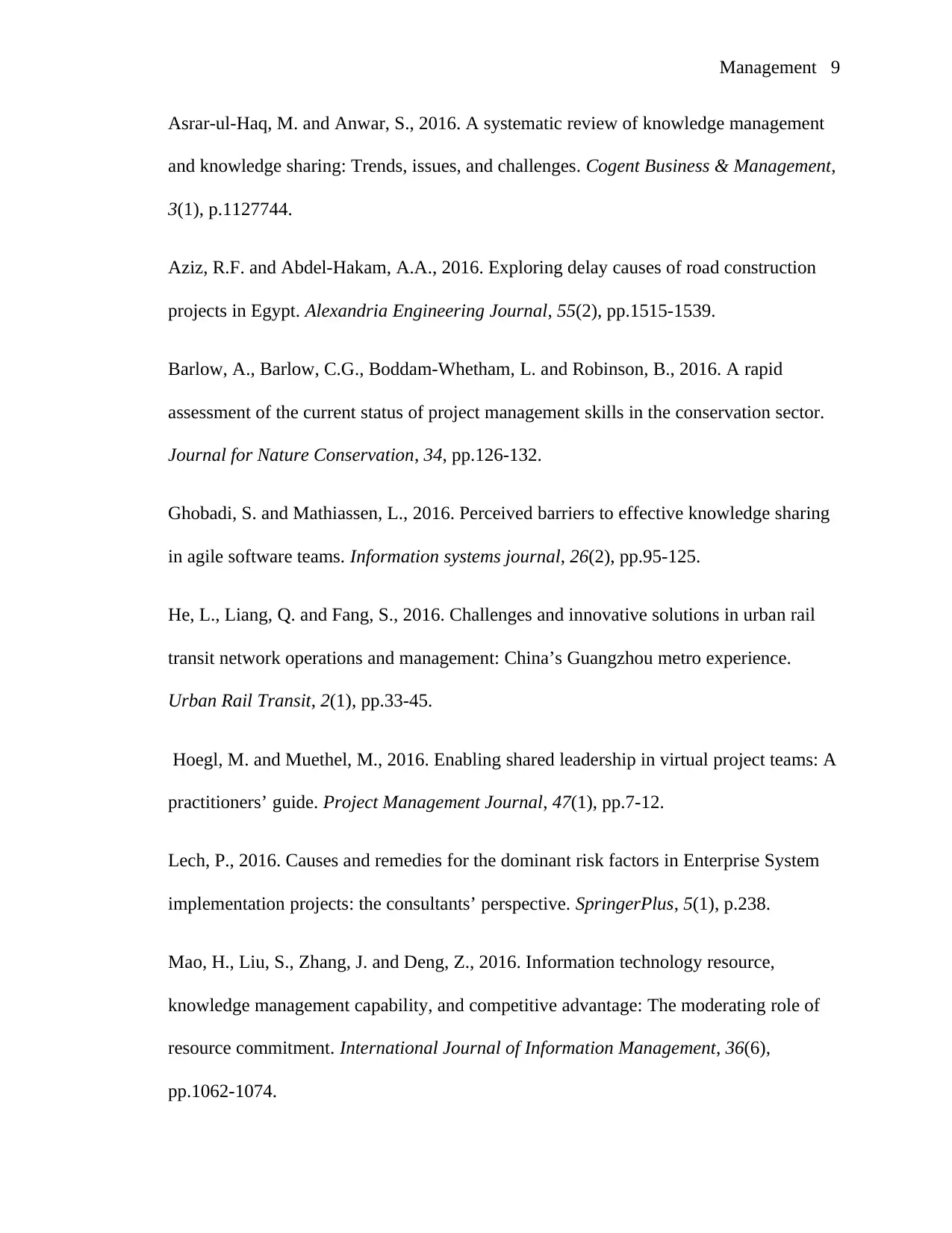
Management 9
Asrar-ul-Haq, M. and Anwar, S., 2016. A systematic review of knowledge management
and knowledge sharing: Trends, issues, and challenges. Cogent Business & Management,
3(1), p.1127744.
Aziz, R.F. and Abdel-Hakam, A.A., 2016. Exploring delay causes of road construction
projects in Egypt. Alexandria Engineering Journal, 55(2), pp.1515-1539.
Barlow, A., Barlow, C.G., Boddam-Whetham, L. and Robinson, B., 2016. A rapid
assessment of the current status of project management skills in the conservation sector.
Journal for Nature Conservation, 34, pp.126-132.
Ghobadi, S. and Mathiassen, L., 2016. Perceived barriers to effective knowledge sharing
in agile software teams. Information systems journal, 26(2), pp.95-125.
He, L., Liang, Q. and Fang, S., 2016. Challenges and innovative solutions in urban rail
transit network operations and management: China’s Guangzhou metro experience.
Urban Rail Transit, 2(1), pp.33-45.
Hoegl, M. and Muethel, M., 2016. Enabling shared leadership in virtual project teams: A
practitioners’ guide. Project Management Journal, 47(1), pp.7-12.
Lech, P., 2016. Causes and remedies for the dominant risk factors in Enterprise System
implementation projects: the consultants’ perspective. SpringerPlus, 5(1), p.238.
Mao, H., Liu, S., Zhang, J. and Deng, Z., 2016. Information technology resource,
knowledge management capability, and competitive advantage: The moderating role of
resource commitment. International Journal of Information Management, 36(6),
pp.1062-1074.
Asrar-ul-Haq, M. and Anwar, S., 2016. A systematic review of knowledge management
and knowledge sharing: Trends, issues, and challenges. Cogent Business & Management,
3(1), p.1127744.
Aziz, R.F. and Abdel-Hakam, A.A., 2016. Exploring delay causes of road construction
projects in Egypt. Alexandria Engineering Journal, 55(2), pp.1515-1539.
Barlow, A., Barlow, C.G., Boddam-Whetham, L. and Robinson, B., 2016. A rapid
assessment of the current status of project management skills in the conservation sector.
Journal for Nature Conservation, 34, pp.126-132.
Ghobadi, S. and Mathiassen, L., 2016. Perceived barriers to effective knowledge sharing
in agile software teams. Information systems journal, 26(2), pp.95-125.
He, L., Liang, Q. and Fang, S., 2016. Challenges and innovative solutions in urban rail
transit network operations and management: China’s Guangzhou metro experience.
Urban Rail Transit, 2(1), pp.33-45.
Hoegl, M. and Muethel, M., 2016. Enabling shared leadership in virtual project teams: A
practitioners’ guide. Project Management Journal, 47(1), pp.7-12.
Lech, P., 2016. Causes and remedies for the dominant risk factors in Enterprise System
implementation projects: the consultants’ perspective. SpringerPlus, 5(1), p.238.
Mao, H., Liu, S., Zhang, J. and Deng, Z., 2016. Information technology resource,
knowledge management capability, and competitive advantage: The moderating role of
resource commitment. International Journal of Information Management, 36(6),
pp.1062-1074.
⊘ This is a preview!⊘
Do you want full access?
Subscribe today to unlock all pages.

Trusted by 1+ million students worldwide
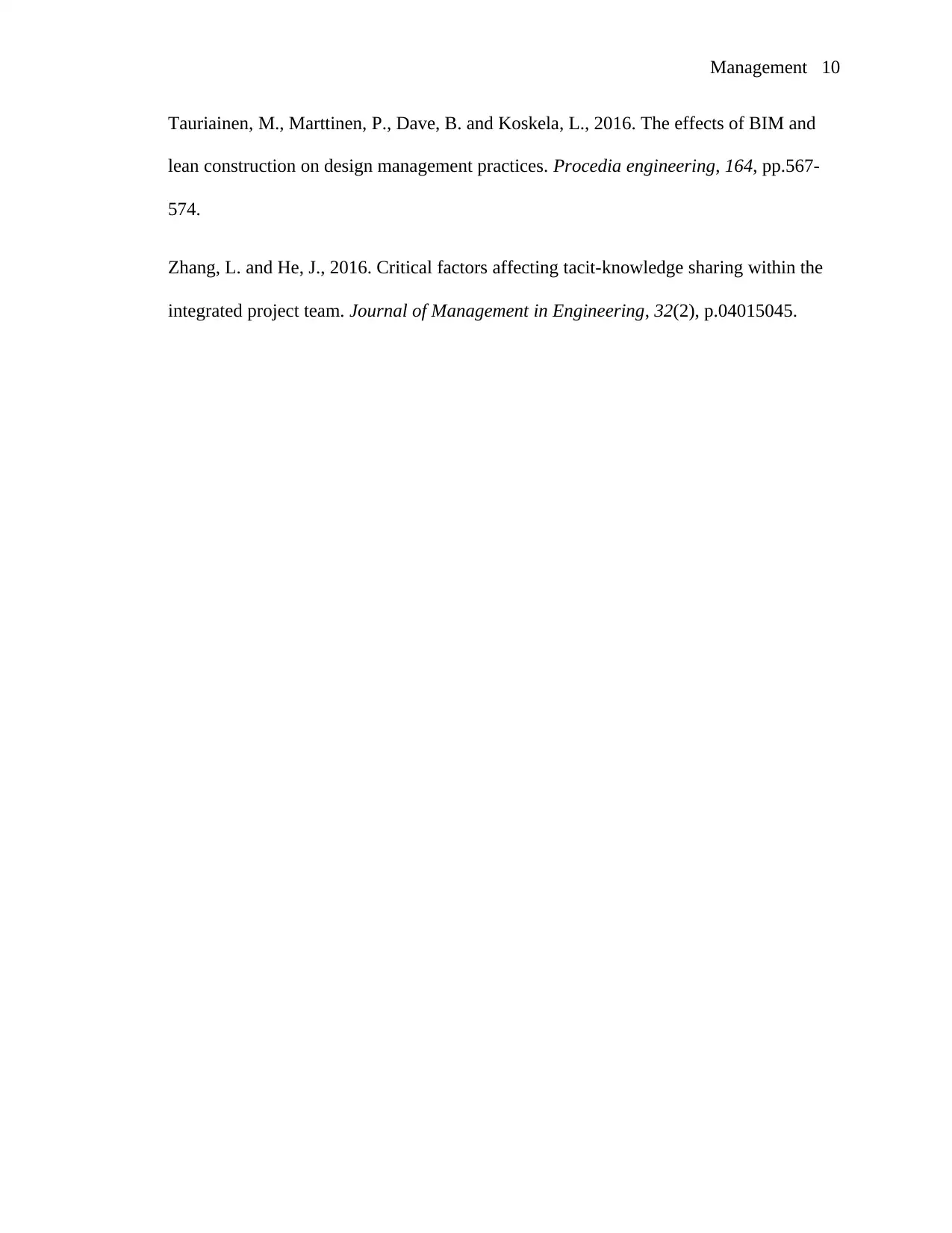
Management 10
Tauriainen, M., Marttinen, P., Dave, B. and Koskela, L., 2016. The effects of BIM and
lean construction on design management practices. Procedia engineering, 164, pp.567-
574.
Zhang, L. and He, J., 2016. Critical factors affecting tacit-knowledge sharing within the
integrated project team. Journal of Management in Engineering, 32(2), p.04015045.
Tauriainen, M., Marttinen, P., Dave, B. and Koskela, L., 2016. The effects of BIM and
lean construction on design management practices. Procedia engineering, 164, pp.567-
574.
Zhang, L. and He, J., 2016. Critical factors affecting tacit-knowledge sharing within the
integrated project team. Journal of Management in Engineering, 32(2), p.04015045.
1 out of 10
Related Documents
Your All-in-One AI-Powered Toolkit for Academic Success.
+13062052269
info@desklib.com
Available 24*7 on WhatsApp / Email
![[object Object]](/_next/static/media/star-bottom.7253800d.svg)
Unlock your academic potential
Copyright © 2020–2025 A2Z Services. All Rights Reserved. Developed and managed by ZUCOL.




